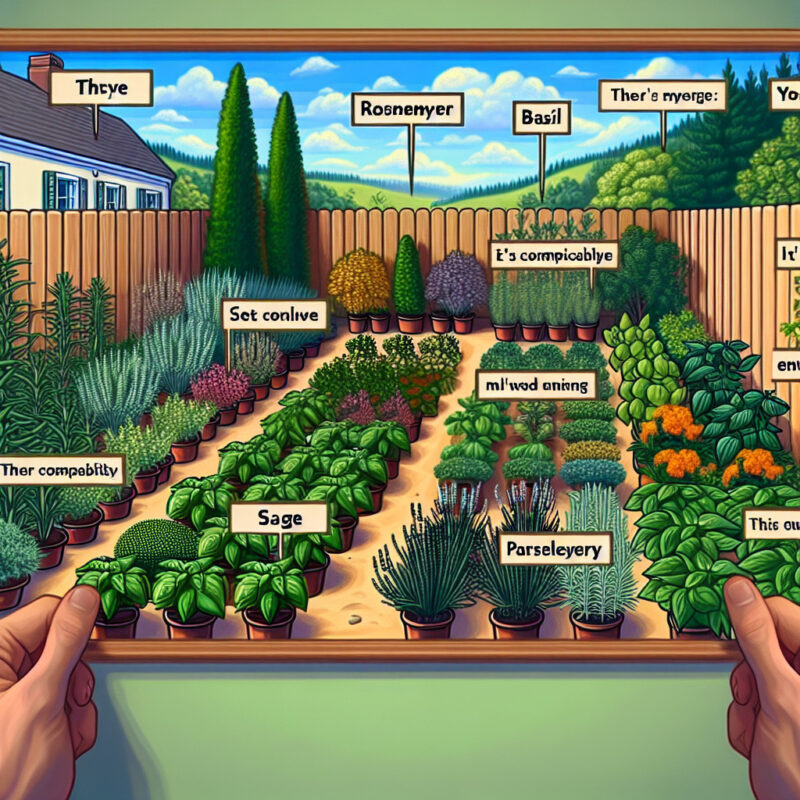Rosemary, the fragrant and versatile herb that adds depth to a wide array of dishes, is a prized addition to any herb garden. Its distinct aroma and assertive flavor make it a standout choice for culinary enthusiasts and herbalists alike. However, what many may not realize is that rosemary is also an excellent companion plant, benefiting both its neighboring herbs and the gardener. In this article, we will delve into the world of companion planting, exploring the science behind it and uncovering the best herbs to plant alongside rosemary. So, whether you are a seasoned gardener looking to diversify your herb garden or a novice attempting your first horticultural endeavor, read on to discover the perfect companions for your beloved rosemary plant.
key Takeaways
- Planting compatible herbs with rosemary can enhance its growth and flavor.
- Basil and lavender are excellent companion plants for rosemary.
- Basil’s aroma can repel pests and improve the health of rosemary.
- Lavender complements rosemary well and attracts beneficial insects.
- Mint and thyme can be planted alongside rosemary, but with caution.
- Mint can overtake the garden if not contained, so grow it in a pot.
- Thyme can thrive with rosemary, as they share similar soil and water needs.
- Marjoram and sage also make good companions for rosemary.
- Marjoram attracts pollinators, while sage repels pests.
- Avoid planting parsley and cilantro near rosemary, as they have different water requirements.
What Herbs Can be Planted Alongside Rosemary?
Rosemary, a popular herb known for its culinary and medicinal uses, can thrive when planted alongside certain companion herbs. These companion herbs not only enhance the growth and flavor of rosemary but also provide pest control and natural pollination. Here are some top choices of herbs to plant with rosemary in your garden:
1. Sage
As a member of the mint family, sage is an excellent companion herb for rosemary. Its aromatic foliage helps to repel pests such as cabbage moth and carrot fly, while attracting beneficial insects like bees and butterflies. Planting sage alongside rosemary can create a visually appealing and beneficial herb garden.
2. Thyme
Thyme is another herb that pairs well with rosemary. Both rosemary and thyme require similar growing conditions, including well-drained soil and full sun. When planted together, these two herbs not only provide a stunning visual display but also promote mutual growth and protection against common pests and diseases.
3. Lavender
Known for its beautiful flowers and soothing fragrance, lavender makes an ideal companion herb for rosemary. Both herbs are compatible in terms of soil conditions and sunlight requirements. Planting lavender alongside rosemary not only adds aesthetic value but also attracts pollinators such as bees, thus benefiting both plants.
4. Oregano
Oregano, with its aromatic leaves and delicate flowers, complements rosemary perfectly. The two herbs are compatible in terms of their watering needs and can thrive when planted together. Oregano not only enhances the flavor of rosemary but also helps to deter pests such as aphids and spider mites, making it a valuable companion herb for gardeners.
5. Marjoram
Marjoram, a close relative of oregano, is another herb that can be planted alongside rosemary. It shares similar growth requirements and often makes a harmonious combination in the garden. Marjoram not only adds flavor to rosemary when used in cooking but also attracts beneficial insects that prey on harmful pests.
6. Chamomile
Chamomile, with its daisy-like flowers and calming properties, can thrive alongside rosemary. Both herbs prefer well-drained soil and full sun, making them compatible companions. Planting chamomile near rosemary not only provides a visually appealing contrast but also attracts important pollinators like bees and butterflies.
By strategically planting these companion herbs alongside rosemary, you can create a vibrant and flourishing herb garden. These herbs not only enhance the growth and flavor of rosemary but also provide natural protection against pests and promote pollination. So, consider these options when deciding which herbs to plant with rosemary in your garden.
What are the benefits of companion planting with rosemary?
Companion planting refers to the practice of planting certain herbs, vegetables, or flowers together to maximize their growth, health, and deter pests. When it comes to planting herbs with rosemary, there are several benefits:
1. Pest control:
Rosemary has natural pest-repellent properties, and by planting certain herbs alongside it, you can enhance its effectiveness. For example, planting basil with rosemary is great for pest control as basil repels flies and mosquitoes, while rosemary repels aphids. Additionally, plants like thyme and sage can repel cabbage moths and carrot flies when planted with rosemary.
2. Improved flavor:
Companion planting can also enhance the flavor of herbs. When certain herbs are planted together, they can create a harmonious flavor profile. For instance, planting oregano with rosemary can enhance the taste of both herbs, making them a perfect combination for Italian dishes. Similarly, planting lavender with rosemary can create a lovely fragrance and add a hint of floral essence to your culinary creations.
What are some popular options for companion planting with rosemary?
When it comes to companion planting with rosemary, there are several popular options that can benefit both the growth and flavor of the herbs. Here are some top choices:
1. Thyme:
Thyme is a fantastic companion plant for rosemary. Both herbs thrive in similar conditions, preferring full sun and well-drained soil. When planted together, thyme can help deter pests like cabbage worms and spider mites, while also enhancing the flavor of rosemary. Thyme’s delicate leaves and earthy aroma make it an excellent addition to Mediterranean dishes.
2. Sage:
Sage and rosemary are a classic combination in herb gardens. These two herbs have similar growing requirements and their flavors complement each other well. Together, they can deter pests like cabbage moths and carrot flies. Sage’s pine-like scent and slightly peppery flavor pair beautifully with rosemary in savory dishes, making them a popular duo in many cuisines.

